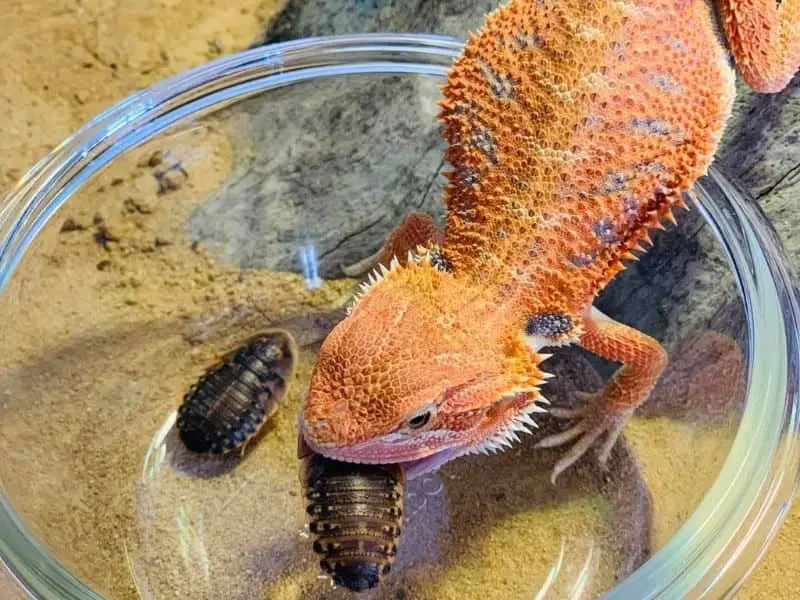Dubia roaches are a great feeder insect for bearded dragons. Dubia roaches provide the protein that bearded dragons need, as well as other essential nutrients like calcium and vitamin A. Bearded dragons will also enjoy eating dubia roaches because they are tasty insects to them.
Like most foods for reptile pets, aim at supplementing the dubia roaches with other foods to provide them with a balanced diet. In this article, we’ll examine how many dubia roaches should be fed to bearded dragons on a daily basis, and where you can buy these nutritious bugs in bulk for your pet reptiles.
Are dubia roaches good for bearded dragons?

Dubia roaches are one of the most popular feeder insects for bearded dragons. Dubia roaches are nutritious because they provide protein, calcium, and vitamin A to bearded dragons.
Can bearded dragons eat roaches? Bearded dragons not only eat dubia roaches but they actually love their taste. Dubia roaches have about the same fat content (54%) as the bearded dragons’ favorite food in the wild (grasshopper with 53% body fat content). This makes them an ideal food for your dragons.
What is the nutritional value of dubia roaches?
Dubia roaches contain high levels of protein as well as other nutrients that help create a healthy diet for your beardie like fat, calcium and vitamin A. Combining these with vegetables will make sure there’s plenty of variety in your pet’s meals.
Bearded Dragons are omnivores so you’ll need both meat sources (insects) and plant matter (vegetables). They like eating kales and collard greens and protein-rich foods like mealworms and dubia roaches.
Avoid feeding your bearded dragons with spinach or beet greens given the high amount of oxalates they contain. These oxalates can inhibit the absorption of calcium by the bearded dragon.
Some important nutritional information about dubia roaches is as follows:
Extra-large dubia roaches:
- Moisture: 65.6%
- Fat: 7.2%
- Fiber: 2.9%
- Phosphorous: 2600mg/kg
- Calcium: 800mg/kg
- Protein: 23.4%
- Ash: 1.3%
Extra-small dubia roaches:
- Moisture: 71.5%
- Fat: 6.1%
- Fiber: 2.6%
- Phosphorous: 2600mg/kg
- Calcium: 700mg/kg
- Protein: 21.4%
- Ash: 1.3%
This information makes it easy to determine how much of the dubia roaches you need to feed your bearded dragon with. An averagely-sized dubia roach will nutrition about halfway between the two extremes.
Are dubia roaches safe for bearded dragons?
Yes, dubia roaches are safe to offer as a food source for your beardie because they contain high levels of protein that create healthy diets with other nutritious ingredients like fat, calcium, and vitamin A which will make sure there’s plenty of variety in your pet’s meals.
They primarily feed on vegetables and fruits, but will also consume meat products from the stomachs of dead insects. This is not only healthy for your beardie; it can be nutritious as well.
Dubia Roaches are an excellent mealworm alternative because they don’t have bristles like their close cousins, which makes them better suited for lizard food consumption.
READ MORE: Guide for How Many Mealworms to Feed a Bearded Dragon
Are Dubia roaches safe for baby bearded dragons?
Dubi roaches are safe to feed baby bearded dragons if they’re gut-loaded and not too big. Dubia roach nymphs will be the easiest size for smaller beardies, but it’s important to remember that even small dubia can bite. Safety should thus be a priority.
In general, adult bearded dragons should only be offered bigger Dubia – such as adults or large pupae. Always make sure your baby dragon is hungry before offering any insect food. Also, never leave an animal unattended with live insects so you don’t accidentally scare them off and give your pet nothing to eat.
Do Dubia roaches bite?
Dubia roaches are gentle creatures, and they do not bite. That is why Dubia roaches are a great feeder for bearded dragons and many other animals that have special dietary needs or who would be harmed by the bugs’ natural defense mechanisms like biting.
What is the importance of diet and nutrition when owning a bearded dragon?
Owning a bearded dragon can be expensive so it’s important to ensure good nutrition by finding ways to cut down on costs without compromising dietary needs. Feeding dubia roaches and meal worms once or twice per week cuts back significantly on cost while providing essential nutrients for the growing or breeding beardie.
How many Dubia Roaches should I feed my bearded dragon?
For the experience for your bearded dragon, you should feed them dubia roaches every day. The amount depends on the size of the bearded dragons and how many you have in a tank.
If they are under two inches long then they can eat as much as 100 at one time. If they are over four ounces or so then fifty is enough for them to feel full but not too full that it could make them sick. If there’s only one I would say give him/her about ten dubia roaches just to be safe because they love food.
Can a bearded dragon eat an adult Dubia Roach?
A bearded dragon can eat an adult Dubia roach as long as it is a healthy, mature individual. The Dubia Roach may not be the best choice for food because they are too large and can cause impaction in your pet’s intestine.
Babies and children of bearded dragons should only eat baby dubias or crickets to avoid any negative health effects that could arise from eating the dubia roaches being discussed here.
READ ALSO: Can Bearded Dragons Eat Spiders?
How much do Dubia Roaches cost?
It’s difficult to say because prices vary from store to store but usually around $0.50 per dubia roach or more depending on where you purchase them from. You may want to ask what other food sources they offer so it doesn’t seem like such a steep price for your new pet.
You can search for “dubia roaches for bearded dragons for sale” to find some in your area. Also, searching for “bearded dragon food for sale” or “bugs for bearded dragons” will bring up dubia roaches as one of the options
How to keep dubia roaches for bearded dragons
The best conditions for dubia roaches are a dark, dry and warm environment. They need to be kept in an enclosure that is long-lasting with good ventilation because they don’t like changes too much.
The best substrate for this would be something natural such as bedding or soil. Avoid pine shavings which can cause respiratory problems over time. Dubia Roaches should be fed once every other day. If you’re not feeding them daily remove the leftover food from their habitat while fresh food is being provided otherwise it starts to rot and create disease.
The size of your colony will depend on how many dragons you have. For one dragon, keep just two females but for three dragons, use five females minimum. One female lays about 100 eggs per year providing enough dubia roaches for a colony.
The best way to get started is by buying the juveniles which are smaller than adults but they grow quickly so that, in a few months, you will have a large colony. They’re easy to care for as long as there’s water present. With proper feeding rates depending on the size of colony being cared for, dubia roaches should not be difficult to maintain over time.
Can you leave Dubia roaches in bearded dragon tank?
Dubia roaches are quite gentle and safe to leave in a bearded dragon tank. They are not likely to crawl out of the tank and are not a threat to the dragon. Dubia roaches may even feed on some of the uneaten food in their enclosure, which would be beneficial for them.
Dubia roaches also do well in captivity so they won’t escape or die easily either way.
The same holds true with other types of live prey that can be used as feeders like black soldier flies (BSF) and crickets; they too will stay put once introduced into an enclosure but should eventually leave naturally if left long enough without being fed upon by any type of animal inside it.
What to feed dubia roaches for bearded dragon (gut loading)
You can feed your dubia roaches all sorts of healthy food to help them grow bigger and stronger for your beardie. Feeding dubia roaches is a great way to offer protein and calcium in their diet, but they also need other nutrients like vitamin A, D, E and B12.
You can feed fruit (peeled banana or apple), vegetables (cucumber slices or romaine lettuce) cooked eggs, oatmeal with honey or raisins dried apricots/dates. Other foods include carrots peeled into thin strips; watermelon rinds; collard greens; pumpkin seeds etc. You will want to avoid feeding anything too high in fat though so as not to promote obesity among the roaches.
This way, your bearded dragon eating dubia roaches will be filled with health benefits which go a long way in ensuring the bearded dragon grows into a healthy, strong and happy animal.
In conclusion, dubia roaches are a safe and nutritious food that bearded dragons can enjoy. Dubia roaches are easy to feed, easy to keep in captivity, inexpensive compared to other foods like crickets or mealworms, they produce very little waste and the entire colony benefits from a dubia roache buffet with plenty of protein for everyone.
READ NEXT: 9 Reasons Why a Bearded Dragon is Waving: What It Means
